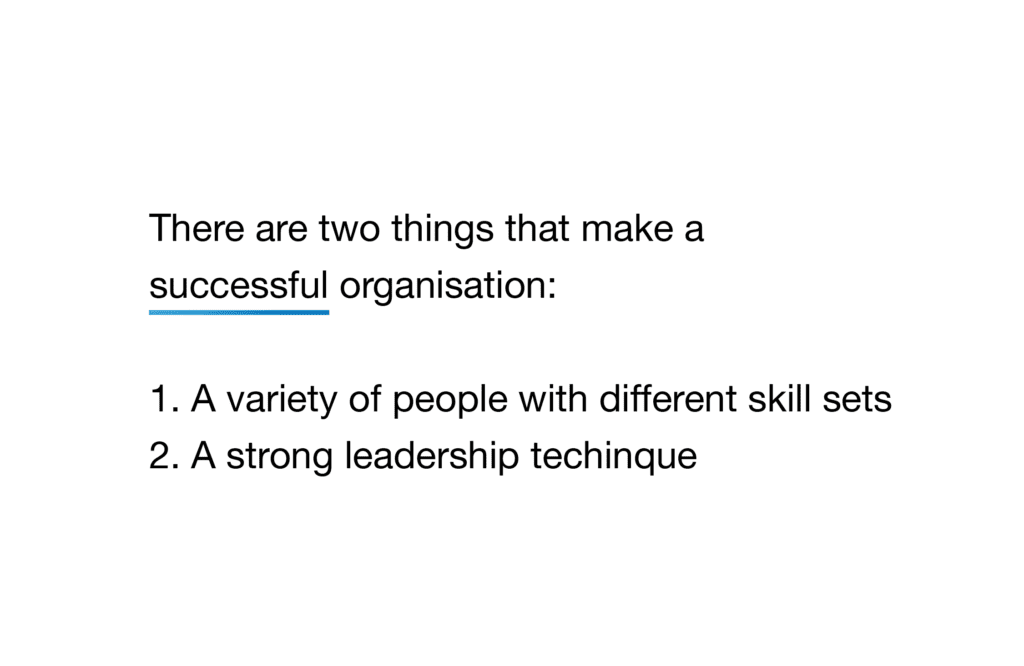Building a team for success is more than just selecting the best candidates for the job. IT solutions London company Nutbourne says getting the right kinds of personalities, skills and types of intelligence is a balancing act. And its one that SMEs need to master if they want to go from good to great.
Here at Nutbourne, IT solutions London, Managing Director Marcus Evans shares his insights into getting the right balance of personalities and skills so that your organisation is ready and primed for growth.
You Need A Mix Of Intelligence
If you compare successful organisations with those that are less successful and those that are poor, two things stand out. The first is that the successful organisations have a variety of people. They have a variety of skill sets and they have a variety of intelligence within the company. They tend to have groups of people that are either technically intelligent, emotionally intelligent, or commercially intelligent; they’ll also have those that are creative and have common sense. Those are very different kinds of skills to the occupational skills i.e. the expertise required to do your job, but they’re just as necessary.
The second way that successful companies differ from less successful companies is in leadership style. Companies that don’t have as much success tend to be led by people that don’t think they need to listen to the people below them. In that scenario, you fail to engage the expertise, soft skills and natural abilities that people have.
Hiring and firing tends to be very black and white i.e. candidates are hired for their CV alone, and not for their fit within the organisation as a whole. That works for some companies, but only in the short term. The people on the ground will only be ignored for so long before they become apathetic and/or want to leave. That’s no way to run a successful business.

Strike The Right Balance For Your Service
If you want to grow the organisation, then blending complementary skill sets and types of intelligence is necessary. At Nutbourne, we employ very distinct types of people. We have the technical experts that solve the IT issues, providing IT solutions in London. They are highly competent within a technically demanding field. On the other hand we have our dispatch team and our client relation team. Both of those require interpersonal skills because their roles are client facing – so there’s a tacit need for emotional intelligence.
What’s interesting is that all three departments need elements of the others. The engineers need appropriate communication skills to liaise with clients when they’re troubleshooting technical issues. The dispatch team and client services team need a level of technical expertise. Thats if they’re to successfully liaise with clients and handle any relationship queries.
By balancing those skill sets, natural tendencies and types of intelligence within the Nutbourne team, we’re able to foster a learning environment that benefits our core functions.
What that looks like for another organisation will be markedly different. If, for example, you run a cleaning company you will need good technical skills combined with good emotional intelligence. Such as the ability to deal with clients face-to-face and keep them happy. It differs from company to company depending on the service they sell, and the balance will differ too.
Iterate At The Point Of Quality Service
There is trial and error in finding the right balance of intelligence within your company, and it does take time to get right. But when you get it right, the quality of your service will be very high; the specifics of what you do will keep your clients returning and your reputation will be good. There will also be strong cohesion between your departments and in turn, fewer bottlenecks with delivery, issues with client retention and problems with internal dynamics.
At Nutbourne, we’ve had a relative degree of success. The company started out as three people in an attic and is now 28 people strong. My co-founder Patrick and I have always placed a strong emphasis on culture and the type of people we employ; in fact we pride ourselves as much on the quality of our culture as we do on the quality of our IT Solutions in London.

The Organisational Structure of Our IT Solutions London Company
This is partly down to the structure of our senior management. The higher up the organisation chart you go, the more specific the skill sets and personality types there are.
At the director level, you have Patrick who is highly creative and technically very gifted. Reporting to him are the Guru team – our team of senior technical experts, and our technical managers. Sitting next to Patrick is me; I’m very strategic, figures orientated and business minded. I look after the strategic and commercial side of the company. As a pair, our skill sets complement each other and are united by the trust and value we place in the people around us.
What this structure also allows for is a vertical exchange of specific knowledge, from the ground up and from the top down. Those on the ground benefit from the specific knowledge Pat and I have, and there is crossover between technical delivery and service delivery. Equally, Patrick and I benefit from the experience, insight and challenges our teams have. That helps us to make better decisions and to create a better working environment for our team at Nutbourne IT Services. In turn, this has helped us to develop better products and services for our clients and ensures we’re meeting their demands.
Moreover, it creates a learning environment in which all skill, knowledge and abilities are valued. It allows us to evolve as individuals and as an organisation – the results of which are a company that is successful and always ready to grow.
Or to find out more information and advice on team building theories to benefit your business then take a look at Bruce Tuckman’s 1965 Team-Development Model consisting of forming, storming, norming and performing within the team roles.
To find out more about what we do and the IT solutions in London that we provide, call us today on 0203 137 7273, or visit our contact page. If you would like to read more into the services we offer then head over to our services page to find out more information.
